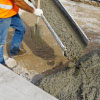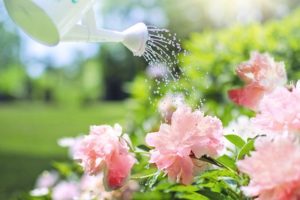Five Top Watering Tips for Gardeners
The onset of summer usually means warmer weather and many of your plants will need a helping hand if they are to continue to flourish. Bark mulch suppliers Madingley Mulch, who are based on the outskirts of Cambridge, have compiled these five helpful tips for gardeners who may be worried about how much water their plants should get and when.
Pick Your Time to Water
The best time to water is either in the early morning or evening. Both times allow the water to run down into the soil and reach your plants’ roots without losing too much excess water to evaporation. This would be more likely to happen if you water during the heat of the day.
If anything, the early morning is better because it will make the water available to your plants throughout the day, ensuring they can cope with the heat of the sun. Watering in the early evening means any leaves have little time to dry out before night comes, which increases the chance of your plants suffering from a fungal problem such as mildew.
Always ensure you water the stem or root of your plants, rather than the foliage, as this will ensure the moisture goes where it is needed most.
Pick Drought-Tolerant Plants
If you are worried about the size of your water bill, then some types of plants retain moisture better than others. If you have your own vegetable patch, cabbages, leeks, parsnips and carrots need very little watering. Some perennial herbs such as rosemary and sage shouldn’t need much attention, even in warm summers.
Other plants which can thrive in hot conditions include hebe and lavender, and any species with silver or grey-green leaves. This is because they can reflect the sun’s rays better and won’t need such regular watering. Lawns, trees and mature shrubs can be left unwatered as they will always recover when rain does finally arrive.
For the record, the plants which will need a lot of moisture include any seedlings, cuttings and young plants, particularly if you are growing them in your greenhouse. Tomatoes, cucumbers, spinach, lettuce and celery are all quite thirsty, while annual flowers need regular watering too because of their shallow root systems.
For How Long?
Generally, plants should be given a thorough soaking – for at least 20 seconds. This is important because it allows the water to go deep into the soil, and it allows your flowers and shrubs to set down stronger and longer roots.
If you have a hose pipe, use your nozzle or shower attachment to give a wide, gentle spray. Fast, narrow jets can damage both the soil and younger plants.
Use a Water Butt
Installing a water butt is a relatively cheap way of ensuring that your plants can continue to get a regular supply of moisture without using the mains supply. Most houses have a drainpipe or downpipe system, and all you need to do is install a diverter so any rain will fill up the water butt. All water butts have a tap which you can use to fill up your watering can.
Another ‘green’ alternative is to use ‘grey water’ which is recycled from bathrooms and kitchens. This is particularly useful if there is a hosepipe ban in force, but for hygiene reasons it’s advisable not to use this water source on your vegetables or anything you eat.
Lay Down Some Mulch
Another way of ensuring that you don’t need to worry too much about the time and expense of watering the garden is to improve the condition of your soil. A mulch will help improve your its ability to retain water, as well as suppressing any weeds. This is important because these unwanted species can deprive your plants and garden of valuable moisture and nutrients. As specialist bark mulch suppliers, we can provide composted, landscape and premium bark for gardeners in and around the Cambridge area.
We also stock a number of soil conditioners, including Denise’s Delight, an exclusive mixture of Black Fen soil, well-rotted horse manure, wood shavings and other plant nutrients.
Bark Mulch Suppliers Madingley Mulch
Madingley Mulch supply paving slabs, fencing, decorative stones, any many other gardening items to customers across Essex, Hertfordshire, Suffolk and Cambridgeshire, as well as mulches and soil conditioners. If you would like to know more about any of our products then you can call us on 01954 212144 or click on this link and fill in the online form.
We run a weekly delivery service to towns and villages in the area, including Huntingdon, Ely, Royston, Newmarket and Saffron Walden. However, due to the current high demand for our products, it may take around two weeks for us to fulfil your order.
Back to blog




